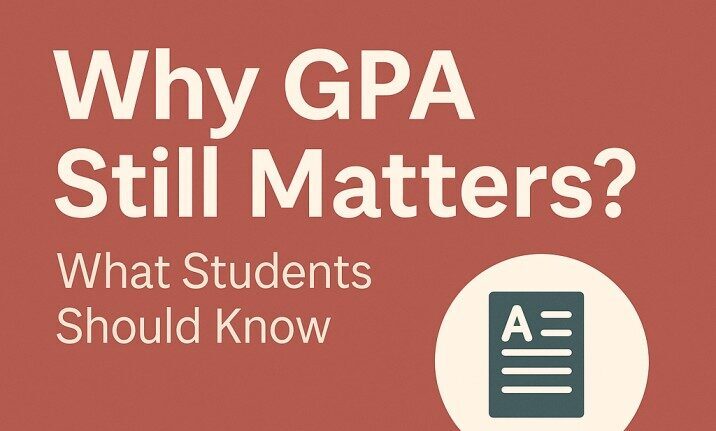In an age where test-optional college applications and portfolio-based evaluations are becoming more common, many students find themselves asking: Does GPA still matter? The truth is, your Grade Point Average (GPA) remains a critical factor in many aspects of your academic and professional journey. Whether you’re aiming for college admissions, scholarships, internships, or even graduate school, your GPA still plays a central role in shaping those opportunities.
Understanding why GPA is important goes beyond just numbers on a transcript. It reflects your ability to perform consistently, manage time effectively, and handle academic challenges. A strong GPA not only sets you apart in competitive application pools but also helps you qualify for financial aid, leadership programs, and early-career opportunities. In this article, we’ll break down the real reasons GPA still matters for students in 2025 and beyond—and how you can leverage it to your advantage.
✅ Want to track your progress the smart way? Use the free GPA calculator at MyEvaluationPal to calculate your GPA and plan your academic goals.
GPA Still Matters in College Admissions
While many universities have adopted test-optional admissions, they still rely heavily on GPA as a primary evaluation tool. Your high school GPA is one of the most consistent indicators of your academic performance and your ability to succeed in a college setting. Admissions officers look at:
- Cumulative GPA
- GPA trends (upward or downward)
- Course rigor (AP, IB, honors classes)
Even if standardized tests are optional, GPA continues to be a baseline filter for many colleges. A strong GPA shows that you’re academically prepared and can manage the demands of higher education.
🔗 Related: How to Calculate Your GPA (With Examples)
GPA is Key for Scholarships and Financial Aid
Many scholarships require a minimum GPA, especially merit-based scholarships. Whether it’s a school-sponsored award, a government grant, or a private scholarship, your GPA often determines your eligibility. In some cases, a difference of just 0.1 in GPA can determine whether you receive full or partial funding.
A solid GPA helps you:
- Qualify for competitive scholarships
- Maintain eligibility for renewable aid
- Stand out in scholarship application essays
Having a high GPA can also give you a better chance at receiving aid with fewer application requirements.
Employers and Internships Still Look at GPA
If you’re applying for internships or entry-level jobs while in school, your GPA can still matter—especially in competitive industries like finance, consulting, and engineering. Employers may use GPA as a filter when reviewing hundreds of resumes.
A good GPA indicates:
- Strong work ethic
- Time management skills
- Academic discipline
Even though employers might not ask for your GPA later in your career, it often plays a role in securing your first internship or job.
Grad Schools Require Competitive GPA Scores
Thinking about applying to graduate school, medical school, or law school? Your GPA will definitely matter. Graduate programs often have strict minimum GPA requirements, and top-tier programs may expect a 3.5 GPA or higher.
Your GPA can influence:
- Admissions decisions
- Fellowship or assistantship eligibility
- Waivers for GRE or other entrance exams
In research-based programs, GPA often acts as a proxy for your academic potential and research capability.
GPA Reflects Your Academic Growth and Effort
Your GPA tells a story. A student who starts with a 2.5 GPA but gradually improves to a 3.7 demonstrates resilience, consistency, and growth—traits that schools and employers respect. Many colleges value an upward GPA trend just as much as a high GPA.
Tracking your GPA semester-by-semester helps you:
- Set realistic academic goals
- Identify problem areas early
- Create action plans for improvement

Use the GPA calculator at MyEvaluationPal to keep your academic progress visible and actionable.
When GPA Might Matter Less
While GPA is important, it’s not everything. Some schools and employers focus more on skills, portfolios, or work experience. Examples include:
- Art and design schools (where portfolios matter more)
- Tech companies that prioritize coding tests or project experience
- Test-blind colleges
However, even in these cases, a good GPA never hurts—and it often opens doors to additional resources, honors programs, or leadership roles.
Your GPA is more than just a number—it’s a reflection of your consistency, your academic habits, and your long-term performance. Whether you’re planning to apply for college, compete for scholarships, land your first internship, or prepare for grad school, GPA still plays a crucial role in your success.
While it’s true that we live in a more holistic evaluation era, your GPA can still set you apart. Don’t dismiss its value. Use it as a tool for growth, a motivator for improvement, and a stepping stone toward your academic and career goals.
🎯 Ready to take control of your GPA? Use the free GPA calculator at MyEvaluationPal to track your grades, set targets, and boost your academic performance today.

Leave a Reply